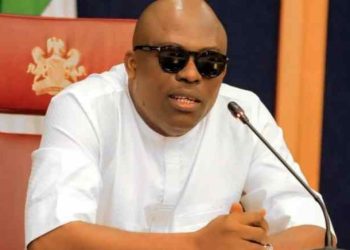*93.5 million Nigerians to determine next president, Yakubu says
For engaging in multiple registrations of voters during the last voters’ listing exercise, the Independent National Electoral Commission (INEC), has commenced the in-house sanctioning of 23 of its officials.
The commission record showed that some of the 23 officials attempted to register some fake voters 40 times, the INEC National Chairman, Prof. Mahmood Yakubu, disclosed Thirsday during the third quarterly meeting with political parties and media chiefs, in Abuja.
Ahead of next year’s general election, the electoral umpire also declared that 93.5 million Nigerians are eligible to participate in the exercise as voters, noting that 12.29 million Nigerians successfully completed their registrations as new voters in the just-concluded Continuous Voter Registration (CVR).
Prof. Yakubu added that after a rigorous clean-up of the data, using the Automated Biometric Identification System (ABIS), over 2.78 million were identified and removed as ineligible registrants.
Consequently, he said the commission has identified 23 of its registration officers for severe sanctions having attempted to engage in multiple registration of those that were deleted as having been involved in the registration malpractices.
Yakubu’s disclosures came as the Inter-Party Advisory Council IPAC passed a vote of confidence on him for his innovations to reshape the electoral process.
*CUPP hails INEC for deleting over 2.7 million fake registration
The political parties specifically hailed the deployment of the Bimodal Voter Accreditation System, BVAS, and the INEC Result Viewing IReV Portal in the recently concluded elections in the country and for next year’s general election.
*23 officials for punishment
Speaking at the meeting, the INEC chairman said: “The Commission deployed thousands of diligent staff for the CVR exercise and the vast majority of them discharged their duties conscientiously. Unfortunately, a few of them did not. The fictitious registrations were carried out by some of our Registration Officers involved in the field exercise and could easily be traced. Each registration machine is operated using an access code tied to a dedicated e-mail assigned to staff.
“There is therefore an audit trail that gives the total number of persons registered by each official involved in the registration exercise. In some cases, some of them made as many as 40 attempts or more to register one fake voter. As a result, the Commission has so far identified 23 Registration Officers involved in this unethical conduct and disciplinary action has commenced. We shall continue to protect the integrity of our voters’ registers. It is pivotal to credible elections. It is also a national asset and easily the largest database of citizens in Africa and one of the largest in the world.”
*No going back on BVAS, IReV
Yakubu again declared that the decision to deploy BVAS and IReV for the forthcoming polls is cast in stone.
He said only last week, the INEC commenced the training of master trainers on election technology to ensure a seamless process, adding that from Thursday, INEC will commence the same training at the zonal level and subsequently train all its ad-hoc staff for the 176,846 polling units nationwide.
“Let me once again reassure Nigerians that there is no going back on the deployment of the Bimodal Voter Accreditation System, BVAS, for voter accreditation. There is no going back on the transmission of results to the INEC Result Viewing Portal IReV in real-time on Election Day.
“There will be no Incident Form that enables ineligible persons to vote using other people’s Permanent Voters Cards, PVCs, during elections. We are committed to ensuring that the 2023 General Election is transparent and credible, reflecting the will of the Nigerian people,” he said.
*Media chiefs urge INEC to rejig position of voting cubicle, ballot boxes
Also, during their meeting with the INEC, media executives appealed to the commission to redesign the positioning of the voting cubicle and ballot boxes so as to beat party agents and members who are exposed to voters’ choices, thereby fuelling vote buying.
The media chiefs were of the opinion that just as INEC has been adjusting its balloting procedures, leading to improvements, it should also try to analyse where party agents and voters stand during balloting so as to halt the exposure of ballot papers by voters to enable them qualify to be paid.
They also urged the commission to devise means of beating desperate politicians to their game of vote suppression by repeating ballot in places where violence marred elections, and not just working out the effect of non-voting vis-a-vis statistical effect on result of such elections.







